Undoubtedly, diesel generators have become widely accepted by homeowners as a reliable and efficient means to power their homes during unexpected outages. Whether you’re preparing for power grid failures, severe weather, or simply want a reliable backup energy source, diesel generators offer reliability, longevity, and performance that make them superior to other products on the market. This guide serves as your comprehensive resource on residential diesel generators, including their functionality, advantages, and key considerations when selecting one for your home.
Understanding Diesel Generators
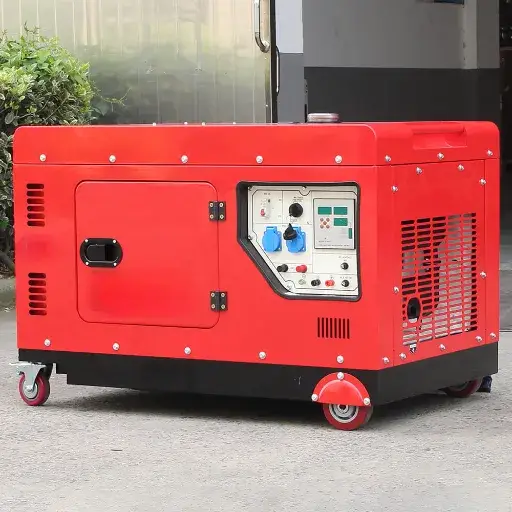
Diesel generators are machines that convert diesel fuel into electricity. They operate via an internal combustion engine that ignites the diesel, producing mechanical energy. This mechanical energy is then transformed into electrical energy by an alternator. Diesel generators are highly efficient and capable of maintaining constant power supply for extended periods, making them ideal for homes during power cuts. Their robustness ensures longer lifespan with less upkeep than other generator types, and they perform well even in harsh environments.
⚡ Key Consideration: Power output, fuel consumption, and noise level are critical factors to consider when selecting the right diesel generator that will be energy-efficient and meet your home’s energy needs.
What is a Diesel Generator for Home?
A home diesel generator is a power system that provides backup electricity and operates on diesel fuel. These generators use energy from diesel combustion to generate electricity, serving as the primary power source during grid failures or when the electric grid is unavailable. Diesel generators are commonly used in homes due to their ability to run quietly and effortlessly for long periods with proper maintenance.
🏠 Modern Features Include:
- Automatic transfer switches
- Fuel efficiency enhancements
- Low emissions technology
- Eco-friendly operation
- Power for essential home appliances, lights, HVAC systems, and more
How Diesel Generators Work
Diesel generators convert the chemical energy of diesel fuel into mechanical energy, which ultimately becomes electricity. The process begins with the combustion of diesel in the engine—air is compressed to very high temperature and pressure, causing the fuel to ignite. The burning pushes the piston, which rotates the crankshaft connected to the alternator. The alternator, through electromagnetic induction, transforms the mechanical rotation into electrical power.
🔧 Engine
Combustion chamber
⚙️ Alternator
Power conversion
⛽ Fuel System
Diesel supply
❄️ Cooling System
Temperature control
💨 Exhaust System
Emission control
🎛️ Control Panel
Operation management
The control panel plays a significant role in managing the generator’s operation, ensuring both safety and efficiency. These systems work seamlessly together to provide electricity to households and industrial operations.
Benefits of Using Diesel Powered Generators
⛽ Fuel Efficiency
Diesel engines offer excellent fuel efficiency, especially for continuous, heavy-duty use, though they can be expensive to operate in the long run.
🛡️ Durability and Longevity
Diesel generators are built to withstand demanding conditions; with proper care, they can last for many years.
⚡ High Power Output
Diesel generators provide a reliable, continuous power supply, making them ideal for large-scale operations that require substantial electricity.
🔧 Low Maintenance Requirements
Compared to other generator types, diesel engines require less frequent, simpler maintenance, leading to lower downtime and costs.
🌍 Wide Availability of Fuel
Diesel fuel is readily available almost everywhere globally, making operation in isolated areas or during power cuts hassle-free.
Types of Home Generators
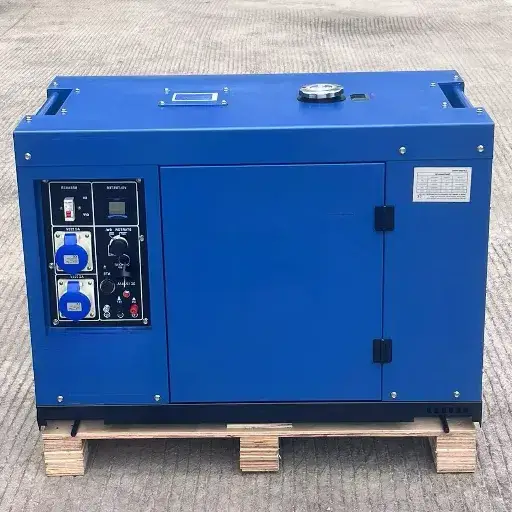
Home generators include portable, standby, inverter, and solar-powered models, each suited for different needs and circumstances.
| Type | Power Source | Use Case | Noise | Cost |
|---|---|---|---|---|
| Portable | Gasoline/Diesel | Temporary | Moderate | Low-Moderate |
| Standby | Natural Gas/Propane | Backup Power | Low | High |
| Inverter | Gasoline | Electronics | Low | Moderate |
| Solar-Powered | Solar Panels | Eco-Friendly | Silent | Moderate-High |
Standby Generators vs. Portable Generators
Standby generators are permanent, automated systems for backup power, while portable generators are compact, mobile solutions for temporary power needs.
| Parameter | Standby | Portable |
|---|---|---|
| Installation | Permanent | Temporary |
| Power Source | Gas/Propane | Gas/Diesel |
| Automation | Automatic | Manual |
| Power Output | High | Moderate |
| Mobility | Fixed | Mobile |
| Noise | Low | Moderate |
| Cost | High | Low |
| Maintenance | Moderate | Easy |
| Use Case | Backup | Temporary |
| Eco-Friendliness | Moderate | Low |
Whole House Generators Explained
Whole-house generators are dependable power sources that can provide electricity to an entire house during power outages. These generators are installed permanently and are usually connected to the home’s existing natural gas or propane supply. They come with automatic transfer switches that detect power outages and seamlessly switch over with minimal interruption to daily routines. They’re powerful enough to run essential appliances, HVAC systems, and large electronics simultaneously.
📈 Growing Trend
Recent search trends indicate rising interest in whole-house generators, driven by their convenience, reliability, and ability to withstand extreme weather.
Key Advantages:
- Immediate benefits of uninterrupted power
- Increased home value
- Peace of mind and security
- Automatic operation (no manual intervention needed)
- Long-term power security solution
Cummins Diesel Generators for Home Use
Cummins diesel generators are a dependable power supply solution for residential areas. These generators are designed for durability and provide consistent service during power outages. Cummins generators feature automatic startup, minimal fuel consumption, and steady power availability. They have a reputation for extreme durability and long lifespan.
🏆 Why Choose Cummins?
- Extensive warranties
- Solid support network
- Long-term reliability
- Worry-free operation
- Quiet power supply
Choosing the Right Diesel Generator for Your Home
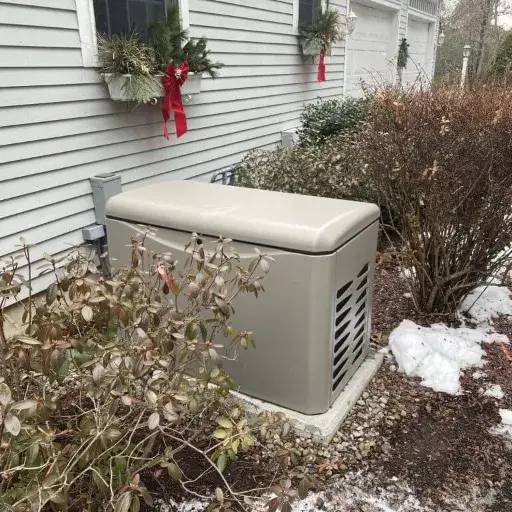
In selecting the ideal diesel generator for home use, power output, fuel efficiency, and noise levels are crucial factors to consider. Conduct a power-requirement analysis of your home to determine the wattage needed to keep essential devices running during grid failures.
💡 Smart Selection Tip: Choose a generator that consumes less fuel to save on long-term costs. If quietness is necessary, opt for a model with soundproofing. Always verify good customer service and warranty coverage for easy maintenance.
Assessing Your Power Needs
To accurately assess your power needs, start by identifying the essential household items and appliances you plan to use during blackouts. Create a list with power requirements in watts for each item (typically found on labels or user guides). Calculate the total to determine overall wattage requirements.
⚠️ Important Consideration
For motor-operated items like refrigerators or air conditioners, consider their surge wattage, which exceeds running wattage during startup. Choose a generator with output exceeding your total wattage to ensure uninterrupted performance and room for additional power needs.
Optimal Power Capacity for Different Home Sizes
Energy consumption habits and the power required by different home sizes are essential factors in determining the optimal generator capacity.
🏠 Small House or Apartment
Recommended Capacity: 3,000 – 5,000 watts
Covers basic items such as lighting, a refrigerator, and small electronic devices.
🏡 Medium-Size Home
Recommended Capacity: 7,000 – 10,000 watts
Enables running additional devices, such as a dishwasher, washing machine, or microwave, as well as basic items.
🏰 Large House
Recommended Capacity: 12,000+ watts
Required for energy-hungry appliances like central air conditioning. Ensures all major and luxury compartments run without interruption.
💚 Pro Tip: Many homeowners prefer flexible generators that can meet unforeseen needs. It’s safer to invest in higher-capacity generators for peace of mind and future upgrades or additional appliances.
Factors to Consider When Selecting a Model
⚡ Power Output Requirements
Calculate total wattage of essential household appliances and systems. Ensure the generator can handle both running and starting wattage.
⛽ Fuel Type and Availability
Evaluate the generator fuel type (gasoline, propane, or diesel) and analyze its availability and storage requirements in your region.
🔇 Operating Noise Level
Noise level can be crucial, especially in residential areas. Search for models with lower decibel ratings to minimize disturbance to neighbors and household members.
📦 Portability and Installation
Choose between a portable generator for convenience or a standby generator, permanently installed and working seamlessly during power outages.
🛡️ Safety Features
Ensure the generator has built-in safety features, such as overload protection, low-oil shutdown, and carbon monoxide detection, to ensure safe operation.
Installation Process of Diesel Generators
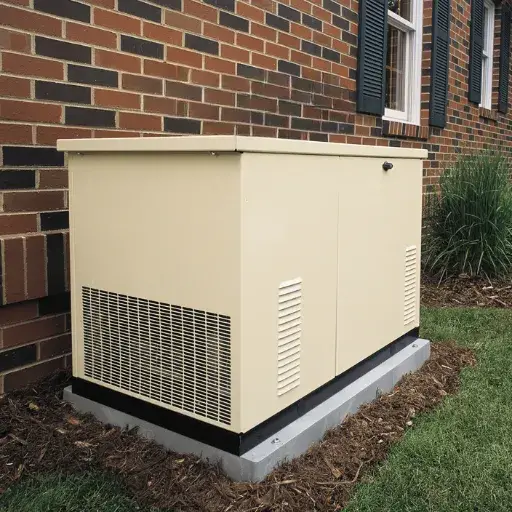
🔧 Installation Steps
1. Choose an Appropriate Location
Select an area with good air circulation, flat and stable ground, away from living spaces to minimize noise and pollution.
2. Prepare the Foundation
Build a solid concrete or metal base that supports the generator and reduces vibrations.
3. Connect Fuel Supply
Install fuel line correctly, following safety rules, and check for any leaks.
4. Set Up Electrical Connections
Have a qualified electrician connect the generator to your home’s electrical system via a transfer switch.
5. Perform Initial Testing
Power up the generator, test its operation, and verify smooth power supply during outages.
6. Schedule Regular Maintenance
Establish a routine maintenance plan to guarantee safe and reliable operation over time.
Professional Installation vs. DIY Approaches
Professional installation ensures expertise, compliance, and reliability, while DIY approaches offer cost savings and flexibility but require technical skills and entail greater risk.
| Key Point | Professional | DIY |
|---|---|---|
| Expertise | Certified Specialists | Limited Skillset |
| Compliance | Code-Adherent | May Miss Codes |
| Reliability | High Assurance | Variable |
| Cost | Higher Expense | Lower Expense |
| Time Required | Faster Completion | Potential Delays |
| Safety Risks | Minimized | Elevated |
| Customization | Limited | Highly Customizable |
| Tool Access | Provided | May Need Purchase |
Step-by-Step Installation Guide
- Select an Appropriate Site
Choose a dry, well-ventilated, and flat location. The site must meet local noise and emissions regulations.
- Make the Foundation
Build a strong, vibration-proof foundation or slab. Must be level and able to support the generator’s weight and operational vibrations.
- Check the Generator
Thoroughly inspect for damage or missing parts. Confirm all connectors, cables, and accessories are present.
- Fuel System Installation
Install the fuel system meeting safety standards. Secure fuel tank, check fuel lines for leaks, and ensure proper connections.
- Set the Exhaust System
Connect the exhaust pipe properly to the generator’s exhaust outlet, route it to an open area away from enclosed spaces, and check for proper sealing.
- Connect the Electrical System
Connect to intended electrical lines with secure connections. Hire a licensed electrician to ensure compliance with local regulations.
- Install the Cooling System
Attach and connect as recommended by the manufacturer. Ensure adequate airflow and check coolant levels for optimal operation.
- Lubricants and Fluids Addition
Fill with recommended oil, coolant, and other fluids. Regularly check fluid levels to avoid operational issues.
- Battery Testing
Install and connect the battery to the respective terminals. Test to ensure it’s charged and functioning properly.
- Pre-Start Inspections
Double-check connections, fluids, and system configuration according to the manufacturer’s instructions.
- Startup and Testing
Start the generator and run a test. Note any vibrations, noise, or malfunctions. Test load capacity to confirm it meets the intended power demand.
- Maintenance Schedules Setting
Schedule periodic maintenance checks per the manufacturer’s recommendations. Regular servicing ensures long operational life and reliability.
Permits and Regulations to Consider
Installation and operation of a diesel generator must strictly comply with all relevant permits and regulations. The most important considerations are:
🌍 Environmental Permits
Review permits linked to air quality and emissions. Many regions have strict limits on pollutants a generator can emit.
🔇 Noise Regulations
Comply with local noise regulations to ensure the generator runs at acceptable noise levels, especially in residential areas.
🏗️ Zoning and Building Codes
Check whether zoning laws and building codes permit installing a generator at the chosen location.
⛽ Fuel Storage Requirements
Apply regulations for safe diesel fuel storage and handling to avoid spills, contamination, and fire hazards.
✅ Inspection and Approval
Before starting the generator, obtain required inspections from local regulatory authorities to ensure safe and legal operation.
Handling these regulatory matters ensures generator operations are legal while minimizing environmental or safety risks.
Maintenance Tips for Diesel Generators
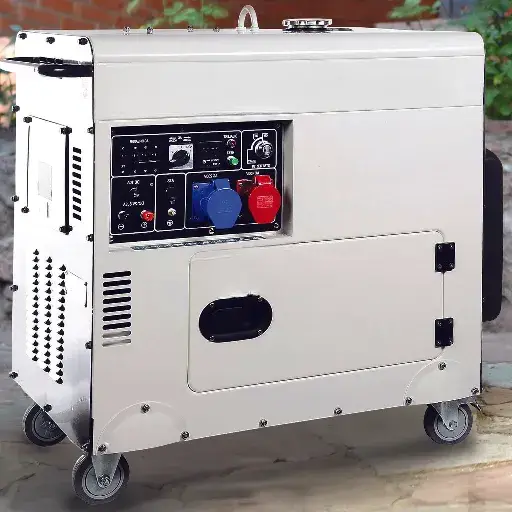
Proper maintenance is essential to extending your diesel generator’s lifespan and ensuring reliable performance when you need it most.
🔧 Essential Maintenance Practices
🔍 Regular Inspections
Conduct routine checks to find leaks, worn parts, or visible damage and detect problems at an early stage.
⛽ Fuel System Maintenance
Change fuel filters periodically and check fuel for cleanliness and absence of contaminants.
🔋 Battery Care
Regularly test and clean battery connections to prevent power issues.
❄️ Coolant System Check
Monitor coolant levels and condition, flush system per manufacturer’s instructions.
🛢️ Oil and Filter Changes
Change engine oil and filters according to usage and manufacturer’s guidelines for optimal performance.
💨 Air Filter Replacement
Inspect and replace air filters regularly to ensure proper airflow and engine efficiency.
⚡ Load Testing
Periodically run load tests to ensure the generator reliably meets required power demands.
Regular Maintenance Practices
| Maintenance Task | Description |
|---|---|
| Oil and Filter Changes | Follow the manufacturer’s recommended oil and filter change intervals to maintain smooth operation and prevent engine wear. |
| Coolant Inspection | Maintain coolant levels by ensuring it’s clean and at the correct concentration to prevent overheating. |
| Battery Maintenance | Inspect battery terminals for corrosion, ensure battery is fully charged, and check periodically during operation. |
| Fuel System Checks | Remove dirt or old fuel layer, check for leaks that could disrupt a steady fuel supply. |
| Exhaust System Inspection | Inspect the exhaust system regularly for damage, leaks, or blockages to ensure safety and operational efficiency. |
Common Issues and Troubleshooting
❌ Generator Fails to Start
Reason: Low fuel level, dead battery, or air filter blockage.
Solution: Check and refill the fuel, recharge or replace the battery, and clean or replace the air filters.
⚡ Low Power Output
Reason: Fuel system contamination or worn-out spark plugs.
Solution: Clean the fuel system, replace the filter if necessary, and inspect or replace the spark plugs.
🔥 Overheating
Reason: Lack of ventilation or coolant not topped up.
Solution: Place the generator in a well-ventilated area and refill the coolant as needed.
🔊 Unusual Noise or Vibration
Reason: Loose parts or misalignment.
Solution: Check the generator for loose components and tighten or realign as required.
💧 Fuel Leaks
Reason: Fuel lines or connections breakage.
Solution: Inspect the fuel lines, replace any broken parts, and ensure connections are tight.
💡 Prevention Tip: Regular maintenance is the most effective way to keep these problems at bay and ensure your generator operates safely and reliably.
How to Prolong Generator Lifespan
🔐 Best Practices for Longevity
- Follow Maintenance Schedules: Strictly adhere to manufacturer’s service instructions, including timely oil changes, air filter changes, and spark plug inspections.
- Keep It Clean: Regularly remove dirt, dust, and rust to maintain optimal operating conditions.
- Run Periodically: Let generator run occasionally even when not needed, so parts get lubricated and stay in good shape.
- Use Quality Fuel: Purchase high-quality fuel and add stabilizer when storing for extended periods.
- Proper Storage: Keep in dry place with good air circulation, away from harsh weather to reduce damage and increase lifespan.
By following these periodic practices, you can confidently ensure your generator will be there whenever you need it in the years ahead.
Frequently Asked Questions (FAQs)
❓ What do home standby generators mean and how do they function?
Home standby generators are fully automatic devices that restore power during outages. Usually running on diesel, they can support various electrical loads, keeping essential appliances like refrigerators and air conditioners running. In the event of an outage, the generator automatically starts and uses the predefined fuel type to deliver power to your residence.
❓ What are the differences in power between a 20kW and a 50kW diesel generator?
The major difference is the amount of power they can produce. A 20 kW generator is appropriate for smaller houses with fewer electrical appliances, while a 50 kW generator can power larger homes with more devices. Selecting a generator size depends on your needs and the total wattage of your devices.
❓ What is the procedure to find a proper home diesel generator?
Finding the right generator involves estimating your power needs by considering the total kilowatt (kW) requirement of your appliances, and deciding between single-phase and three-phase generators. Mind noise levels—the best models offer sound protection at 65 dB or quieter. The installation area also plays an important role.
❓ What types of fuel are compatible with standby diesel generators?
Standby diesel generators are typically designed to run on diesel fuel due to its efficiency and reliability. Occasionally, units may be set up to run on alternative fuels, but diesel is preferred due to its economic viability and easy availability. Ensure the generator you choose aligns with fuel supply and cost factors in your local area.
❓ Is it possible to use a diesel generator with an RV?
Absolutely! RV users can use diesel-powered generators. The portability and durability of diesel generators make them popular among RV owners. Choose your RV generator based on total electrical load and whether a soundproof enclosure is needed for quiet operation.
❓ How do I keep my diesel generator running for a long time?
Proper maintenance includes regularly checking the generator, changing its oil and filters, and ensuring the fuel is clean and free of problematic additives. Performing routine maintenance checks can significantly extend your generator’s lifespan and ensure efficient operation during peak demand, such as hurricane season or other emergencies.
⚡ Power Your Home with Confidence
Diesel generators offer unmatched reliability, longevity, and performance for residential power needs. By understanding your power requirements, selecting the right model, ensuring proper installation, and maintaining your generator regularly, you can enjoy uninterrupted power supply and peace of mind during any outage. Invest in the right diesel generator today and secure your home’s energy future.
📚 Reference Sources:
-
Best Diesel Generators for Home Use: Top Picks & Buying Guide – Covers power output, fuel efficiency, noise levels, and safety features of top brands like Perkins and Cummins.
-
Small but Mighty: Portable Diesel Generators for Your Home – Discusses portable diesel generators, their benefits, and maintenance tips.
-
Best Diesel Generator for Home: A Complete Guide – Offers insights into silent and whole-house diesel generator models, focusing on reliability and fuel efficiency.
-
Whole-Home Generators: Your Ultimate Guide to Power Security – Highlights the durability and longevity of diesel generators for larger homes.
-
Home Generator Systems | Whole House & Portable – Provides a comprehensive overview of home generator systems, including standby and portable options, costs, and maintenance.
